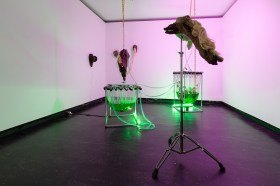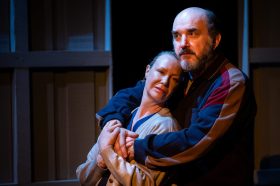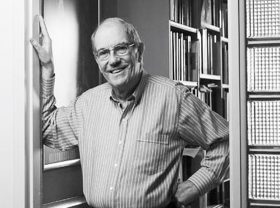Image: shutterstock.com
Most of us transition between different roles throughout our careers in the arts. This might be a leap into an entirely new career, or leaning into a role that is similar to what you already do, but either way, the transition is never easy and comes with a degree of risk and self-doubt. We asked five people in the arts why they made the change and what insight they could offer on transitioning.
From ballet dancer to designer
Sometimes a transition to a new career in the arts is instigated by one thing we can’t control: age.
‘Being a dancer, you understand that your career is at the mercy of so many things. For me, the physicality of the career became more difficult with age and the pressure to sustain the elite level of performance and fitness required, started to become more taxing physically and mentally,’ said Jacob Sofer, Company Director of Keto Dancewear.
‘I was growing tired of the intensity and involvement required by the job. Because of this, I guess there was a point when I started to ask myself ‘what next?’. This happened around the age of 30. I witnessed some of my co-workers around my age, finishing up and moving on to new adventures and I began thinking about my own transitioning process.’
For Sofer this meant starting his own dancewear label with designer Peggy Jackson. Keto was founded while Sofer was still a soloist at The Australian Ballet but in January this year it was announced Sofer would leave the company to focus on the label. He uses his practical knowledge of what dancers need and what’s missing in the market to create a unique and responsive line of Australian products.
‘The fact that I was moving away from a full time artistic job into something different was always going to be exciting and challenging. Investing all of my time into Keto is risky but something I have been longing to do since we started. I see so much potential with our business and I’m excited to explore it all. So far I’m really enjoying the change.’
Career insight: Skills are always transferable
‘Many people comment on how employable dancers are, and I agree. The work ethic ingrained into you, the discipline and attention to detail are all great traits to have. The ‘eye’ for perfection you get from daily self scrutiny in the studio, and pursuing perfect lines has guided the standard of finish our products, website and campaigns. I’ve also found that being adaptable has been a real help when starting your own business,’ said Sofer.
From theatre maker to journalist
Deciding to leave her job as Associate Artist (Writing) at Malthouse Theatre to work as a journalist at The Guardian came at a moment of personal loss for Van Badham following the death of her father.
‘I was just in a place with a lot of introspection and theatre wasn’t really working for me,’ she said.
‘I was approached by The Guardian, they scouted me and asked if I would contribute columns to them. Then when they offered me a contract it just seemed that my life was calling me in a different direction and in the process of a lot of personal change it seemed like a sign that my future lay elsewhere.’
In Badham’s experience, skills developed through the study of dramaturgy do apply to a career in journalism but there is also a downside.
‘I write a lot of political stuff, I understand the performance of politics and the way that words, gestures and story cumulate in the way politicians try to communicate with the people. So it is marvelously handy to have that skill set and that insight,’ she said.
But where her expertise in dramaturgy has made the transition difficult is the onslaught of criticism many journalists (particularly women) face.
‘The process of training as a theatre maker is you spend years learning to take criticism. Even when I was teaching drama at university I used to belt it into students that criticism is good, criticism is worthwhile, criticism makes you stronger and better and there is no arts critic in the world who doesn’t want you to write a brilliant play. Then when became a journalist and I started getting so much criticism – the trolling on Twitter, on Facebook, under the line on my articles, this deluge of hate – I really struggled with it.’
The people criticising don’t want you to become better, instead, they tell you to die, said Badham.
‘It’s really difficult. If someone sends me a letter saying they pray every day for my death – and I do get those letters – it’s very difficult for me to not go, “What have I done? Why am I such a terrible person?”’
‘I became a pretty decent playwright and I became a better playwright by taking criticism on board. But that’s not journalism.’
Career insight: Get ready for things to be different
‘I still feel really awkward around other journalists, because I’m like “Wow, I wasn’t supposed to be here.” And obviously everyone is very nice, but it is surprising. I’m used to theatre people and this is a different practice. You can’t spend an indefinite amount of time to get things right. You have to lock it in and get it done. I really enjoy it and I’m enjoying the change because I love the facts, I love the detail and following the political story.’
From comedy to film
Director of Finer Films Katrina Fleming’s first arts career was in comedy, cabaret and musical theatre. But after appearing in a friend’s tropfest film she realised film was the industry for her.
‘I sat in a bed under hot lights, in satin pajamas pretending to smoke…watching the action around me. It was so disorganised, crazy fun, and I loved it.
‘It was my introduction into indie film and inspired me to produce my friends next two short films – one of which lead to an AWGIE for the writer/director and my introduction into Hollywood via the festival circuit.’
For Fleming, film offered her a ‘legacy’ that was quite different to the transient memory of being on stage, a fixed output that she could return to and view exactly as intended. ‘I was hooked,’ she said.
While there are lots of transferable skills between live performance and film, such as marketing and audience development, there are also very specific technical skills.
‘There was one huge glaring difference between producing live content and producing recorded content: post production,’ said Fleming.
‘I found a company that was happy to give me a desk and an introduction into film as a career in a post facility, as a producer/ writer in exchange for my skills developing their business, which was primarily making corporate films and low-end commercials. It was a 2-year contract to bridge my knowledge gap in sound, vision, visual effects and the post pathways for film stock and digital cameras and editing.’
Career insight: Sexism in film and television is rife
‘I have never been told I couldn’t do something because I was female. Top marks to my father, teachers, community and men in my life – it just didn’t occur to them or to me that I could not do exactly what I wanted to in my career and life, until I started working for ad agencies, which are run by white, private school men,’ said Fleming.
‘This was compounded by my time in Hollywood – which is run by white, Ivy League men. The opportunity to direct is approximately 7% of a man’s opportunity. I’ve never treated people favorably or unfavorably based on their gender, but for some reason… white, privileged males in film, TV and ad agencies are scared of my boobs.’
From architect to artist
It was health issues that instigated Michelle Hamer’s transition from architecture to practicing artist. Hamer had never considered a career as an artist but as her movements became restricted, she found art was a way to stay occupied and to engage with her experience and altered perspective of the world. But her background in architecture continues to influence her practice.
‘My interest in exploring how social fears and aspirations can be understood through the details of everyday life, from the urban to an intimate scale, and the way that details are often the most revealing elements, are concepts I became interested in as an architecture student,’ said Hamer.
Hamer’s training has also come in useful when applying for grants, exhibitions and preparing talks as it taught her early on to articulate concepts and ideas.
‘As students we were required to present our work publicly and constantly. We were also taught to critique our own and others’ work – this involved both preparation and the ability to think, formulate opinions and analyse “on-the- go”. These are all skills I draw on automatically.’
Career insight: Training in a different discipline can be your strength
‘I only knew one artist and didn’t know what processes artists follow to work, exhibit, discuss their work with others or to find other opportunities. This also has benefits in that I don’t have any fixed ideas on the way things should be done,’ said Hamer.
From circus performer to director
Some transitions are intended from the start. ‘I always had in my head that eventually I wanted to be a director but was counselled to have a career as a performing artist first. I think that due to the physical fragility and duration of a circus artist’s career you are often encouraged to stay in it for as long as possible,’ said Zebastian Hunter, former Cirque Du Soleil artist and now Director at the National Institute of Circus Arts Australia.
‘In some ways it may have been opposite from most people who felt like their true calling was being onstage and finding themselves lost when they were no longer physical capable of it, I always knew that I wanted to make work and that it was only a matter of time until I did that.’
Hunter learned early on that to pursue his second career as a director he needed to go back to school and completed a Masters in Arts and Cultural Management at UNISA while on tour through distance learning. Hunter said that while the Masters provided the practical skills for managing artists and running a company he still felt out of depth in a creative sense, so he went to NIDA to complete a Master’s of Fine Arts (Directing).
‘I was offered a role as as a director managing a pre-existing show for an extremely successful Australian company and chose to invest in going to NIDA instead, I felt like I had focused so much of my time fulfilling other people’s visions that I needed time to develop my own.’
Career insight: The timing has to be right
Hunter said he knew if he had taken the job and not gone to NIDA, he probably wouldn’t have gone back to start the course at a later date. ‘If trapeze taught me anything it was that everything in life was about timing, and this timing felt right.’





